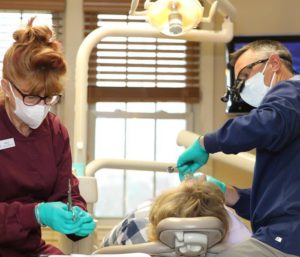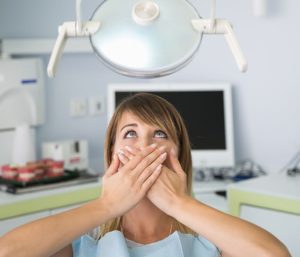Yesterday, I went into one of my hygienist’s rooms to check her patient, a 13-year-old boy, and asked the hygienist how his home care was, because his gums… (Read More)
March 1, 2021
February 22, 2021

This is a phrase we hear far too frequently when patients call to cancel or change their dental hygiene appointments. When the patient is told that there are no open hygiene appointments for 4-6 months, the response is often, “Oh, that’s okay, it’s just a cleaning.” This lack of concern is only partly to blame on the patient; most of the accountability falls in the lap of the dental team.
If you read this column with any frequency, I am sure you have seen me report that 75% of the population has some form of periodontal (gum) disease. I’m sure you have also read that periodontal disease has been linked to heart disease, stroke, pre-term,… (Read More)
February 17, 2021
“There’s not enough time in the day.” Have you ever used this excuse? I said it yesterday to someone. We all tend to waste a lot of time, or at least don’t use the time we have as effectively as we could. You would think that in our technology-filled world, time management would be easier. I think that some of this technology gets in the way by adding even more of a time commitment to things that reduce interpersonal communication.
Here’s an example. It’s time to buy a new… (Read More)
February 8, 2021

Patients see things differently than dentists. Often, what is important to dentists is not important to patients, and vice versa. This seems like the obvious, but dentists often have a blind spot when it comes to seeing things from a patient’s viewpoint.
We often have a similar blind spot in our ability to communicate with patients. When asked to rate their ability to communicate with patients, 60% of physicians rated themselves in the top 10%.
Dentists would probably have similar results.
Communication is key to any relationship. Why then do healthcare professionals, dentists specifically, often have poor communication skills with their patients? There is no one answer to this question, but we (dentists) all struggle… (Read More)
February 1, 2021

You may have heard your dental hygienist tell you to brush and floss more, but what about chewing more gum?
In a study published in PLOS One, researchers found that chewing gum may remove as much bacteria as brushing without toothpaste or flossing. The study was funded by Wrigley……ok, but it’s still interesting.
“This study was initiated as a method development study to determine the number of bacteria that are trapped in a piece of sugar-free gum,” said one of the authors. “According to our knowledge, this is the first time that an estimate of the number of bacteria trapped in a piece of chewed gum is determined.”
For their research, Wessel and colleagues included… (Read More)
January 25, 2021
For example, most people use the term “Novocain”. Even dentists, including myself, use this term daily to describe the local anesthetic used to anesthetize or “numb” teeth before they are worked on. Novocain, apparently still available for purchase, has not been used in dentistry for probably 100 years, but we still use the term because everyone seems to know what we… (Read More)
January 18, 2021
Do you have any problems with dental decay (cavities), gum recession, and/or dental erosion (the chemical breakdown of tooth structure)? These dental issues are complicated multifactorial diseases of epidemic levels affecting both children and adults. A healthy mouth sometimes requires more than brushing, flossing, and “fillings”. With current scientific evidence and new technologies, patients and practitioners need to begin to look at these problems not just from a drilling and filling approach, but also from a medical (preventive/therapeutic) approach.
There are over 19,000 different bacteria that have been found in mouths and every person has about 1,000 different types. Not all of them cause decay, but many of them have also been found to grow… (Read More)
January 11, 2021

There are many people who suffer with pain involving some area of the head. Toothaches can cause pain, but these are mostly avoidable with proper diet, home care and regular visits to your dentist. Teeth can also play an indirect role in facial/head pain.
Orofacial pain includes a number of clinical problems involving the chewing (masticatory) muscles and/or temporomandibular joints (TMJs). Problems can include TMJ discomfort involving muscle spasms in the head, neck, shoulders and/or jaw, migraines or other types of tension headaches, pain with the teeth, face or jaw; and can even play a role in anxiety and/or depression.
You swallow approximately 2,000 times per day, which causes the upper and lower teeth to… (Read More)
January 6, 2021
The more we learn about the body through research and science, the more aware we become about the interconnectedness of all the systems. For example, we now know and continue to learn about the relationship of sleep and its effects on the rest of the body. Sleep breathing disorders, namely sleep apnea, is something that should be routinely screened for by physicians and dentists. While sleep apnea is not necessarily an “oral disorder”, it presents in ways that can be easily screened by a dentist. The key here is the practitioner thinking “outside the box” and treating each patient’s total-body health.
You may have heard the phrase “the mouth is the gateway to the rest… (Read More)
January 4, 2021
At the end of each of the past 15 years, I have used this space to publish these 21 Suggestions for Success authored by H. Jackson Brown, Jr.
Cut this out and put it on the refrigerator. Read this list often and take these suggestions to heart. The more of these you achieve, the better place you are for years like 2020.
- Marry the right person. This one decision will determine 90% of your happiness or misery.
- Work at something you enjoy and that’s worthy of your time and talent.
- Give people more than they expect and do it cheerfully.
- Become the most positive and enthusiastic person you know.
- Be forgiving of yourself and others. … (Read More)
